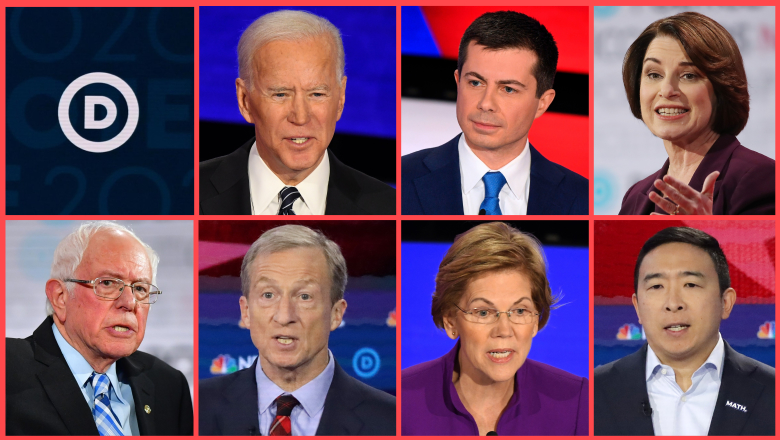
Getty February Democratic Debate
Tonight marks the eighth of the Democratic debates, this time in New Hampshire. The debate is just a few days before the New Hampshire primary. Just how much time do you need to put aside for the debate tonight? Here are the details you need to know about how long the debate is tonight, February 7, 2020.
The Debate Is Scheduled to Last Three Hours
Tonight’s debate is supposed to be three hours long, beginning at 8 p.m. Eastern and ending at 11 p.m. Eastern, according to TV Guide. There’s always a chance, however, that the debate might go a little longer than 11 p.m. Eastern. Since it’s scheduled to be three hours long, it’s less likely that the debate will go long. But there’s always a chance.
According to TV Guide, the debate is airing only on ABC on TV tonight, and it’s called “ABC News: The Democratic Debate.” After the debate, ABC will be airing local programming for 35 minutes, followed by Jimmy Kimmel Live! and then Nightline. These might all be pushed back a bit if the debate goes long.
Any news station you turn to after the debate is over will have plenty of recaps and reviews of the debate. So if you’re planning to host a watch party for this debate, then you might want to budget some extra time.
The lineup for tonight’s debate includes:
- Joe Biden, former Vice President
- Pete Buttigieg, former mayor of South Bend, Indiana
- Amy Klobuchar, Minnesota senator
- Bernie Sanders, Vermont senator
- Tom Steyer, businessman
- Elizabeth Warren, Massachusetts senator
- Andrew Yang, entrepreneur
How are these candidates doing in the polls? According to 538, Sanders is ranking first in two New Hampshire polls for February 5-6. In the Suffolk University poll, Sanders is 24 percent, Buttigieg is 23 percent, Warren is 13 percent, Biden is 11 percent, Klobuchar is 6 percent, and Tulsi Gabbard is 4 percent.
According to the Emerson New Hampshire poll, Sanders is 32 percent, Buttigieg is 23 percent, Warren is 13 percent, Biden is 11 percent, Klobuchar is 9 percent, and Gabbard is 6 percent.
A national Morning Consult poll for February 5 places Sanders first at 25 percent, Biden at 24 percent, Bloomberg at 15 percent, Buttigieg at 12 percent, Warren at 11 percent, and Yang at 5 percent.
A North Carolina Public Policy Polling poll for February 4-5 places Biden first at 25 percent, Sanders at 16 percent, Bloomberg at 14 percent, Warren at 12 percent, Buttigieg at 9 percent, and Klobuchar at 5 percent.
A Monmouth University poll for February 3-5 had Buttigieg at Sanders tied at 28 percent, while another Monmouth poll for the same day had Sanders in first at 27 percent, followed by Buttigieg at 22 percent.
For the most part, Sanders is leading most of the recent polls, followed by Buttigieg, although Biden still leads some. Bloomberg has made some surprising in-roads in some of the polls, but it’s not clear yet if he will gain the polls needed to qualify for the next debate in February.
After this, the next debate will be on February 19 in Nevada. NBC News and MSNBC will co-host a debate with The Nevada Independent in Las Vegas. The requirements are different for the February 19 debate. Candidates must have 10 percent in at least four national or early-state polls in Nevada or South Carolina, or 12 percent in at least two early-state polls. They can also qualify if they have a delegate in Iowa or New Hampshire.
On February 25, CBS News and the Congressional Black Caucus Institute, partnering with Twitter, will host a debate at The Gaillard Center in South Carolina.
READ NEXT: Iowa Caucus Results: State Delegate Counts Debated as Discrepancies Remain